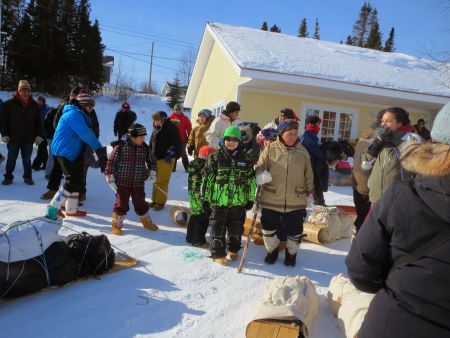K'JIPUKTUK, HALIFAX – Muskrat Falls and the Maritime Link are never far from the headlines in Nova Scotia.
The Maritime Link is shorthand for a mega-project that involves damming the Lower Churchill River, constructing a generating plant at Muskrat Falls in Labrador, and installing the sub-sea cable and overhead transmission lines necessary to deliver electricity to Nova Scotia and beyond.
The discussion here is mostly about costs and benefits – the cost of our monthly power bills and the benefits of 'clean' energy.
Gail Baikie, a person with deep Labrador roots, thinks there is another discussion people in Nova Scotia should have: A discussion about the cost of Muskrat Falls to the people who live there, and the benefits that pass them by.
"Nobody with influence and power is accountabe to the local population," Baikie tells the Halifax Media Co-op. "As a public, as Nova Scotia neighbours, we have an obligation to be aware, and to hold industry and government accountable."
Baikie is an Assistant Professor at the Dalhousie School of Social Work in Halifax. She is also one of the leads in a FemNorthNet project in Happy Valley Goose Bay that focuses on helping local women claim their place amidst development and industrialization.
Baikie's connection with Labrador remains strong. Partly because of her work with FemNorthNet, and partly because of the memories, like those of her Inuit grandfather, who trapped along the Churchill River in Central Labrador for the Hudson's Bay Company. She talks of growing up in a place where the wilderness is never far away.
Now, that wilderness is in retreat.
It is a loss of connection with that wilderness that Baikie considers the ultimate price many people in central Labrador are paying for resource development.
The Muskrat Falls project is a case in point. Once completed, there will be a 41-square kilometer basin where once there was a river and its watershed. Even now, there are barriers which prevent access. Construction of power lines will impact wildlife. The town is growing and changing because of an influx of workers.
Baikie believes that few people in southern Canada understand how central the connection to the land has always been to the long-time inhabitants of Labrador.
"In the North, the land itself is home, it's not a place you go to on the weekend," says Baikie. "Thinking of my grandfather and some of my father's activities, the land is where you live. It's where you work, where you raise your family, where you get your food, it's home.
Baikie talks about returning to Labrador and realizing the extent of the change.
"This is probably the biggest shock for me coming back, that there were people in the community who have not been in the wilderness. That's the most profound change. It really floored me.
"It used to be that Goose Bay consisted of houses in the wilderness. You walked through the woods to go to somebody's home. The women would go berry picking, up in the hills back from where the house was. You wouldn't have to go very far to snare a rabbit. You walked a little way and you are on the river shore and you get yourself a partridge."
As the wilderness retreats, so do memories and long-time connections.
"Lots of women told stories abut their relationship with the river, with the land. They would go there on certain occasions, with their families. Right now people go and there are physical barriers, and it is being torn up," says Baikie.
"Of course it has been a historical place for the Innu. There are ancestral burial grounds along the river, and people lost family members to the river. Then to suddenly see a place like that become something that you can just take and change..."
Whenever there is change, there are winners and losers. The cost of new development is not shared equally but is paid mostly by people on low incomes, women, aboriginals, people with disabilities, and their children.
Baikie talked about these concerns when she presented to the Environmental Assessment Panel tasked with evaluating impacts of the Muskrat Falls development.
"Now the wilderness is accessible only to people who have the boats and money and vehicles and can travel distances, even to just get berries, even to get wild food," says Baikie.
Pressures on Happy Valley Goose Bay infrastructure have increased. The community was never wealthy, and an influx of new workers is making it difficult for many original inhabitants to remain. Rising rents and housing shortages are just some of the changes.
"I never thought I would see homelessness [in Happy Valley Goose Bay], says Baikie. "For a long time, there has been an issue of inadequate housing, but nobody would be homeless, there would be enough family and community linkages."
"We are starting to see urban problems in the hinterland of Canada. There are people who are middle class who have to leave the community because they can't afford the rents. Some of the younger people who are committed to contribute can't come back or can't stay."
Baikie is a bit frustrated that none of this is on our radar in Nova Scotia. She points to the principles that define the Fair Trade movement to make her point.
"I always wonder why that compassionate sense of obligation towards communities impacted by an economic activity is not extended to our own back yard," says Baikie.
"That notion of clean energy that comes from the North that is empty anyways, that is a colonial idea. It's not empty, it is people's home."
See also:
Women's Experiences of Dislocation from the Rivers and Land
Follow Robert Devet on Twitter @DevetRobert



